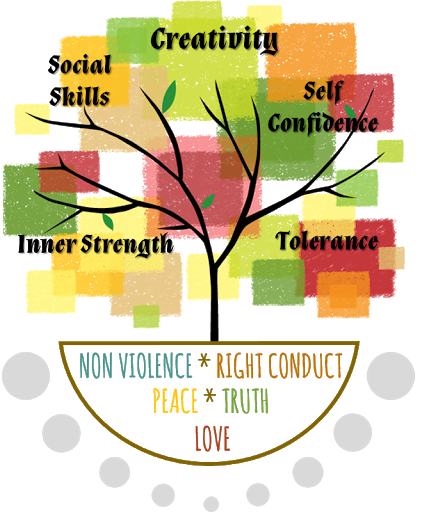
Human values are fundamental to human existence and are integral to any society. They are those qualities that lie within the human personality, waiting to be drawn out and translated into action. They are universal, inherent in all human beings, and intertwined with the cultural and spiritual aspects of life. Human values make life worthwhile, noble, and excellent.
Bringing out and nurturing of the human values in children during the formative years will result in caring and responsible adults in the future. Bringing out human values in adults is an internal motivator that reinforces good character, morality and ethics, resulting in caring and responsible citizens.
There is a wide variety of human values found in varying degrees in all societies, religious traditions, and civilizations. While different societies have different socio-cultural and value orientations, five basic themes of human values relevant to all are:

A key component of Sathya Sai Education is the assertion that there is one ultimate and universal Truth. which may be expressed in a multitude of ways. Truth finds expression in nature. art. music, poetry, ancient scriptures of all faiths. and through scientific discipline. Ultimately. however. Truth is found within. The pursuit of Truth requires discrimination. intuition. and introspection. The highest Truth is that it is changeless in the past, present and future.
The Right Conduct of which we speak is rooted in the Sanskrit word. Dharma. Though Dharma has no literal translation in English. it may be said to encompass the sum total of codes of ethics, ethical behaviour and moral rectitude. The injunction.” do good, see good, and be good” captures the essence and intent of this value. It is rooted in attitudes and habits Inculcated from early childhood that mature into respect and adherence to the duties and responsibilities that come with one’s life circumstances.
Everyone desires and seeks Peace. Lasting Peace cannot be found in the material world. Peace requires the capacity for introspection and self-awareness. Self- awareness enables one to become mindful of his or her thoughts, words and deeds. When self-awareness becomes a habit. the individual begins to monitor and modify the habitual patterns of thought that obstruct the Peace within. True Peace requires inculcating equanimity. regardless of loss or gain, success or failure. pain or pleasure.
The human value of Love may be best expressed as an energy permeating all life. That is, it is not an emotion or passionate feeling of desire and attachment. It refers to something much deeper, and more basic to human nature. It is totally unselfish and independent of whether there is reciprocity. It is kindness. caring. empathy, and compassion. Love is not passive, but active. and it grows, as Sri Sathya Sai Baba would say. “by giving and forgiving”.
The zenith of all human values is Nonviolence. Truth. Right Conduct, Peace. and Love merge in Nonviolence. Nonviolence is a state of mind that recognizes the unity within the apparent diversity. It manifests as non-violation of the laws of nature and respect for law and order. It calls for restraint from the doing of harm to others and to nature in general. Nonviolence is rooted in forbearance, morality. and integrity. When the ethics of Nonviolence are embraced as the means to world peace – there will be global harmony.
Many countries around the world have realised the importance of values education. For instance, Thailand has incorporated Values in the national curriculum. Australia has published a National Framework for Values Education in Australian Schools (2005) and New Zealand has been promoting values education in the curriculum. South Africa has embarked on an initiative on Values, Education and Democracy. China has a national framework of Core Socialist Values. All these initiatives have developed sets of values for education derived out of their specific socio-cultural situations. Drawing out these five inherent human values develops good character. The fundamental principle of SSEHV is that all teaching is based on love and that the teacher’s example in living the values is a critical component.

These five core values can be subdivided further into their practical applications (sub-values) as shown in the table below: